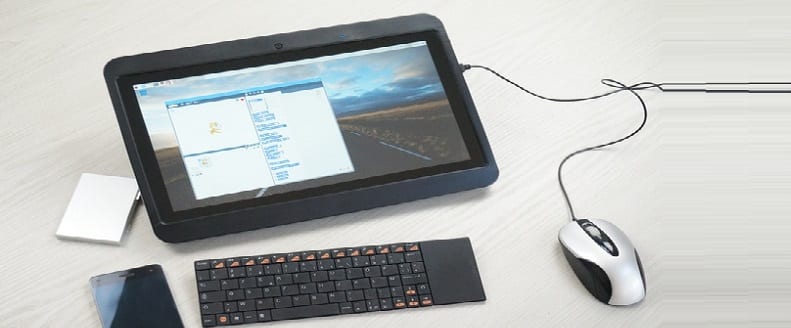
Diskio Pi aims to be a solution that can serve as an additional computer based on the mini pocket computers “Raspberry Pi” or “Odroid.
This project aims to take these minicomputers and turn them into learning code machines or media center to control your home automation, but Diskio Pi can also be used to transform your device into a Tablet or to equip your vehicle.
Although also Diskio Pi aims to reach manufacturers and professionals who require a large touch screen.
The first prototype of the Diskio Pi is the result of this realization of the screen, with the integration of an Orange Pi and a battery. This is what you can do:
As a helmet, a laptop cooler chassis was used, removing the fans and smoothing out everything that went beyond. The top frame is printed in fablab.
The principle of this prototype is the same as in the last one: a general power supply, a buck that converts 12V (or 9V) into 5V, batteries that charge 12V and supply 5V.
All complemented by a powered HUB and a video card, which connects to the PC card via HDMI.

CAD 0.3 prototype
For CAD, each part is modeled with an accuracy of 1/10 mm. Electronic charts and their main components are also modeled.
The result is a virtual assembly that must be manipulated and visualized from all angles, without forgetting anything. And it takes a long time.
The CAD was sent to a plasturgist in China for manufacturing. To save as much as possiblee, in addition to choosing to do it in white ABS, to later switch to acrylic paint.
The hinge for closing the hood is very convenient, it can be quickly opened and closed with 3 screws. The detachable and reversible foot is functional too, although an upgrade will have to be made to release it by hand and let the GPIO rotate.
For version 1.0, other prototypes (0.3.1 and 0.3.2) will need to be manufactured before mass production.

The product proposed in presale.
The final product will be a kit, with all the necessary parts to make a high definition touch screen, 13'3 and compatible with nano cards for PCs such as Raspberry Pi or Odroid. The kit will consist of maps already filled in, it will not be necessary to weld for assembly.
Why a kit?
- Potential buyers are already familiar with development boards, so they can build their own device.
- We all know that most of the discarded electronics are polluting. If the user knows how to mount a device, they will be able to disassemble it and therefore repair it more easily if an item is damaged.
- For the sake of the economy: there is a cost to assembly, which would later be saved (however, it would be partly affected by packaging).
The final device will be a hybrid desktop tablet, ready to accommodate Raspberry Pi 1/2/3 B / B + or Zero, but also Odroids C1 + / C2 / XU4.
Any other Raspberry Pi form factor card is also supported, if your power supply does not exceed 5V and 4A.
Diskio Pi can also be used as a standalone display for a laptop or game console, with a resolution of 1920 × 1080.
The montage
The assembly will not require special knowledge, welding (except in extreme cases). You will need a pair of scissors, a cutter, and a ribbon.
The kit will be delivered with a small screwdriver and a double-sided roll for mounting the screen (consisting of the real screen and the touch glass).
Spare parts
Each cable has a different key for added security. Example 9V, 7.4V and 5V power supplies will have a different connector.
Also, it will come with 2 battery packs. Each pack consists of 2 cells, the 4-cell version will consist of 2 packs and the 6-cell version of 3 packs.
If you want to know a little more about it or are interested in supporting this project, you can visit the following link.
The problem is that a raspi with 1 GB of RAM is not suitable for use as a conventional computer because the RAM is a bottleneck.
I have a Pi 3 B and with the browser with 4 tabs and 2 open libreofice worksheets it sticks. so the truth is no alternative.
It is clear that if you see it that way you will never get satisfaction. In my case I see it as an excellent proposal, to have a portability of my device that in my case I use it with RecalBox, Kali Linux and libreelec.